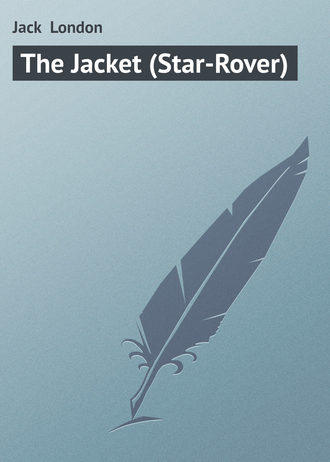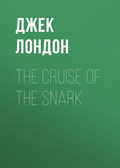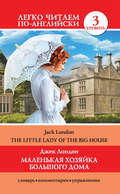
Джек Лондон
The Jacket (Star-Rover)
Jed and I beat up the brush for hundreds of yards all around. They hadn’t told us how long we were to be gone, and since the Indians did not fire on us we kept on going. We were away over two hours, though had either of us been alone he would have been back in a quarter of the time. But Jed was bound to outbrave me, and I was equally bound to outbrave him.
Our foolishness was not without profit. We walked, boldly about under our white flag, and learned how thoroughly our camp was beleaguered. To the south of our train, not more than half a mile away, we made out a large Indian camp. Beyond, on the meadow, we could see Indian boys riding hard on their horses.
Then there was the Indian position on the hill to the east. We managed to climb a low hill so as to look into this position. Jed and I spent half an hour trying to count them, and concluded, with much guessing, that there must be at least a couple of hundred. Also, we saw white men with them and doing a great deal of talking.
North-east of our train, not more than four hundred yards from it, we discovered a large camp of whites behind a low rise of ground. And beyond we could see fifty or sixty saddle-horses grazing. And a mile or so away, to the north, we saw a tiny cloud of dust approaching. Jed and I waited until we saw a single man, riding fast, gallop into the camp of the whites.
When we got back into the corral the first thing that happened to me was a smack from mother for having stayed away so long; but father praised Jed and me when we gave our report.
“Watch for an attack now maybe, Captain,” Aaron Cochrane said to father. “That man the boys seen has rid in for a purpose. The whites are holding the Indians till they get orders from higher up. Maybe that man brung the orders one way or the other. They ain’t sparing horseflesh, that’s one thing sure.”
Half an hour after our return Laban attempted a scout under a white flag. But he had not gone twenty feet outside the circle when the Indians opened fire on him and sent him back on the run.
Just before sundown I was in the rifle pit holding the baby, while mother was spreading the blankets for a bed. There were so many of us that we were packed and jammed. So little room was there that many of the women the night before had sat up and slept with their heads bowed on their knees. Right alongside of me, so near that when he tossed his arms about he struck me on the shoulder, Silas Dunlap was dying. He had been shot in the head in the first attack, and all the second day was out of his head and raving and singing doggerel. One of his songs, that he sang over and over, until it made mother frantic nervous, was:
“Said the first little devil to the second little devil,
‘Give me some tobaccy from your old tobaccy box.’
Said the second little devil to the first little devil,
‘Stick close to your money and close to your rocks,
An’ you’ll always have tobaccy in your old tobaccy box.’”
I was sitting directly alongside of him, holding the baby, when the attack burst on us. It was sundown, and I was staring with all my eyes at Silas Dunlap who was just in the final act of dying. His wife, Sarah, had one hand resting on his forehead. Both she and her Aunt Martha were crying softly. And then it came-explosions and bullets from hundreds of rifles. Clear around from east to west, by way of the north, they had strung out in half a circle and were pumping lead in our position. Everybody in the rifle pit flattened down. Lots of the younger children set up a-squalling, and it kept the women busy hushing them. Some of the women screamed at first, but not many.
Thousands of shots must haven rained in on us in the next few minutes. How I wanted to crawl out to the trench under the wagons where our men were keeping up a steady but irregular fire! Each was shooting on his own whenever he saw a man to pull trigger on. But mother suspected me, for she made me crouch down and keep right on holding the baby.
I was just taking a look at Silas Dunlap-he was still quivering-when the little Castleton baby was killed. Dorothy Castleton, herself only about ten, was holding it, so that it was killed in her arms. She was not hurt at all. I heard them talking about it, and they conjectured that the bullet must have struck high on one of the wagons and been deflected down into the rifle pit. It was just an accident, they said, and that except for such accidents we were safe where we were.
When I looked again Silas Dunlap was dead, and I suffered distinct disappointment in being cheated out of witnessing that particular event. I had never been lucky enough to see a man actually die before my eyes.
Dorothy Castleton got hysterics over what had happened, and yelled and screamed for a long time and she set Mrs. Hastings going again. Altogether such a row was raised that father sent Watt Cummings crawling back to us to find out what was the matter.
Well along into twilight the heavy firing ceased, although there were scattering shots during the night. Two of our men were wounded in this second attack, and were brought into the rifle pit. Bill Tyler was killed instantly, and they buried him, Silas Dunlap, and the Castleton baby, in the dark alongside of the others.
All during the night men relieved one another at sinking the well deeper; but the only sign of water they got was damp sand. Some of the men fetched a few pails of water from the spring, but were fired upon, and they gave it up when Jeremy Hopkins had his left hand shot off at the wrist.
Next morning, the third day, it was hotter and dryer than ever. We awoke thirsty, and there was no cooking. So dry were our mouths that we could not eat. I tried a piece of stale bread mother gave me, but had to give it up. The firing rose and fell. Sometimes there were hundreds shooting into the camp. At other times came lulls in which not a shot was fired. Father was continually cautioning our men not to waste shots because we were running short of ammunition.
And all the time the men went on digging the well. It was so deep that they were hoisting the sand up in buckets. The men who hoisted were exposed, and one of them was wounded in the shoulder. He was Peter Bromley, who drove oxen for the Bloodgood wagon, and he was engaged to marry Jane Bloodgood. She jumped out of the rifle pit and ran right to him while the bullets were flying and led him back into shelter. About midday the well caved in, and there was lively work digging out the couple who were buried in the sand. Amos Wentworth did not come to for an hour. After that they timbered the well with bottom boards from the wagons and wagon tongues, and the digging went on. But all they could get, and they were twenty feet down, was damp sand. The water would not seep.
By this time the conditions in the rifle pit were terrible. The children were complaining for water, and the babies, hoarse from much crying, went on crying. Robert Carr, another wounded man, lay about ten feet from mother and me. He was out of his head, and kept thrashing his arms about and calling for water. And some of the women were almost as bad, and kept raving against the Mormons and Indians. Some of the women prayed a great deal, and the three grown Demdike sisters, with their mother, sang gospel hymns. Other women got damp sand that was hoisted out of the bottom of the well, and packed it against the bare bodies of the babies to try to cool and soothe them.
The two Fairfax brothers couldn’t stand it any longer, and, with pails in their hands, crawled out under a wagon and made a dash for the spring. Giles never got half way, when he went down. Roger made it there and back without being hit. He brought two pails part-full, for some splashed out when he ran. Giles crawled back, and when they helped him into the rifle pit he was bleeding at the mouth and coughing.
Two part-pails of water could not go far among over a hundred of us, not counting the, men. Only the babies, and the very little children, and the wounded men, got any. I did not get a sip, although mother dipped a bit of cloth into the several spoonfuls she got for the baby and wiped my mouth out. She did not even do that for herself, for she left me the bit of damp rag to chew.
The situation grew unspeakably worse in the afternoon. The quiet sun blazed down through the clear windless air and made a furnace of our hole in the sand. And all about us were the explosions of rifles and yells of the Indians. Only once in a while did father permit a single shot from the trench, and at that only by our best marksmen, such as Laban and Timothy Grant. But a steady stream of lead poured into our position all the time. There were no more disastrous ricochets, however; and our men in the trench, no longer firing, lay low and escaped damage. Only four were wounded, and only one of them very badly.
Father came in from the trench during a lull in the firing. He sat for a few minutes alongside mother and me without speaking. He seemed to be listening to all the moaning and crying for water that was going up. Once he climbed out of the rifle pit and went over to investigate the well. He brought back only damp sand, which he plastered thick on the chest and shoulders of Robert Carr. Then he went to where Jed Dunham and his mother were, and sent for Jed’s father to come in from the trench. So closely packed were we that when anybody moved about inside the rifle pit he had to crawl carefully over the bodies of those lying down.
After a time father came crawling back to us.
“Jesse,” he asked, “are you afraid of the Indians?”
I shook my head emphatically, guessing that I was to be seat on another proud mission.
“Are you afraid of the damned Mormons?”
“Not of any damned Mormon,” I answered, taking advantage of the opportunity to curse our enemies without fear of the avenging back of mother’s hand.
I noted the little smile that curled his tired lips for the moment when he heard my reply.
“Well, then, Jesse,” he said, “will you go with Jed to the spring for water?”
I was all eagerness.
“We’re going to dress the two of you up as girls,” he continued, “so that maybe they won’t fire on you.”
I insisted on going as I was, as a male human that wore pants; but I surrendered quickly enough when father suggested that he would find some other boy to dress up and go along with Jed.
A chest was fetched in from the Chattox wagon. The Chattox girls were twins and of about a size with Jed and me. Several of the women got around to help. They were the Sunday dresses of the Chattox twins, and had come in the chest all the way from Arkansas.
In her anxiety mother left the baby with Sarah Dunlap, and came as far as the trench with me. There, under a wagon and behind the little breastwork of sand, Jed and I received our last instructions. Then we crawled out and stood up in the open. We were dressed precisely alike-white stockings, white dresses, with big blue sashes, and white sunbonnets. Jed’s right and my left hand were clasped together. In each of our free hands we carried two small pails.
“Take it easy,” father cautioned, as we began our advance. “Go slow. Walk like girls.”
Not a shot was fired. We made the spring safely, filled our pails, and lay down and took a good drink ourselves. With a full pail in each hand we made the return trip. And still not a shot was fired.
I cannot remember how many journeys we made-fully fifteen or twenty. We walked slowly, always going out with hands clasped, always coming back slowly with four pails of water. It was astonishing how thirsty we were. We lay down several times and took long drinks.
But it was too much for our enemies. I cannot imagine that the Indians would have withheld their fire for so long, girls or no girls, had they not obeyed instructions from the whites who were with them. At any rate Jed and I were just starting on another trip when a rifle went off from the Indian hill, and then another.
“Come back!” mother cried out.
I looked at Jed, and found him looking at me. I knew he was stubborn and had made up his mind to be the last one in. So I started to advance, and at the same instant he started.
“You!-Jesse!” cried my mother. And there was more than a smacking in the way she said it.
Jed offered to clasp hands, but I shook my head.
“Run for it,” I said.
And while we hotfooted it across the sand it seemed all the rifles on Indian hill were turned loose on us. I got to the spring a little ahead, so that Jed had to wait for me to fill my pails.
“Now run for it,” he told me; and from the leisurely way he went about filling his own pails I knew he was determined to be in last.
So I crouched down, and, while I waited, watched the puffs of dust raised by the bullets. We began the return side by side and running.
“Not so fast,” I cautioned him, “or you’ll spill half the water.”
That stung him, and he slacked back perceptibly. Midway I stumbled and fell headlong. A bullet, striking directly in front of me, filled my eyes with sand. For the moment I thought I was shot.
“Done it a-purpose,” Jed sneered as I scrambled to my feet. He had stood and waited for me.
I caught his idea. He thought I had fallen deliberately in order to spill my water and go back for more. This rivalry between us was a serious matter-so serious, indeed, that I immediately took advantage of what he had imputed and raced back to the spring. And Jed Dunham, scornful of the bullets that were puffing dust all around him, stood there upright in the open and waited for me. We came in side by side, with honours even in our boys’ foolhardiness. But when we delivered the water Jed had only one pailful. A bullet had gone through the other pail close to the bottom.
Mother took it out on me with a lecture on disobedience. She must have known, after what I had done, that father wouldn’t let her smack me; for, while she was lecturing, father winked at me across her shoulder. It was the first time he had ever winked at me.
Back in the rifle pit Jed and I were heroes. The women wept and blessed us, and kissed us and mauled us. And I confess I was proud of the demonstration, although, like Jed, I let on that I did not like all such making-over. But Jeremy Hopkins, a great bandage about the stump of his left wrist, said we were the stuff white men were made out of-men like Daniel Boone, like Kit Carson, and Davy Crockett. I was prouder of that than all the rest.
The remainder of the day I seem to have been bothered principally with the pain of my right eye caused by the sand that had been kicked into it by the bullet. The eye was bloodshot, mother said; and to me it seemed to hurt just as much whether I kept it open or closed. I tried both ways.
Things were quieter in the rifle pit, because all had had water, though strong upon us was the problem of how the next water was to be procured. Coupled with this was the known fact that our ammunition was almost exhausted. A thorough overhauling of the wagons by father had resulted in finding five pounds of powder. A very little more was in the flasks of the men.
I remembered the sundown attack of the night before, and anticipated it this time by crawling to the trench before sunset. I crept into a place alongside of Laban. He was busy chewing tobacco, and did not notice me. For some time I watched him, fearing that when he discovered me he would order me back. He would take a long squint out between the wagon wheels, chew steadily a while, and then spit carefully into a little depression he had made in the sand.
“How’s tricks?” I asked finally. It was the way he always addressed me.
“Fine,” he answered. “Most remarkable fine, Jesse, now that I can chew again. My mouth was that dry that I couldn’t chew from sun-up to when you brung the water.”
Here a man showed head and shoulders over the top of the little hill to the north-east occupied by the whites. Laban sighted his rifle on him for a long minute. Then he shook his head.
“Four hundred yards. Nope, I don’t risk it. I might get him, and then again I mightn’t, an’ your dad is mighty anxious about the powder.”
“What do you think our chances are?” I asked, man-fashion, for, after my water exploit, I was feeling very much the man.
Laban seemed to consider carefully for a space ere he replied.
“Jesse, I don’t mind tellin’ you we’re in a damned bad hole. But we’ll get out, oh, we’ll get out, you can bet your bottom dollar.”
“Some of us ain’t going to get out,” I objected.
“Who, for instance?” he queried.
“Why, Bill Tyler, and Mrs. Grant, and Silas Dunlap, and all the rest.”
“Aw, shucks, Jesse-they’re in the ground already. Don’t you know everybody has to bury their dead as they traipse along? They’ve ben doin’ it for thousands of years I reckon, and there’s just as many alive as ever they was. You see, Jesse, birth and death go hand-in-hand. And they’re born as fast as they die-faster, I reckon, because they’ve increased and multiplied. Now you, you might a-got killed this afternoon packin’ water. But you’re here, ain’t you, a-gassin’ with me an’ likely to grow up an’ be the father of a fine large family in Californy. They say everything grows large in Californy.”
This cheerful way of looking at the matter encouraged me to dare sudden expression of a long covetousness.
“Say, Laban, supposin’ you got killed here-”
“Who?-me?” he cried.
“I’m just sayin’ supposin’,” I explained.
“Oh, all right then. Go on. Supposin’ I am killed?”
“Will you give me your scalps?”
“Your ma’ll smack you if she catches you a-wearin’ them,” he temporized.
“I don’t have to wear them when she’s around. Now if you got killed, Laban, somebody’d have to get them scalps. Why not me?”
“Why not?” he repeated. “That’s correct, and why not you? All right, Jesse. I like you, and your pa. The minute I’m killed the scalps is yourn, and the scalpin’ knife, too. And there’s Timothy Grant for witness. Did you hear, Timothy?”
Timothy said he had heard, and I lay there speechless in the stifling trench, too overcome by my greatness of good fortune to be able to utter a word of gratitude.
I was rewarded for my foresight in going to the trench. Another general attack was made at sundown, and thousands of shots were fired into us. Nobody on our side was scratched. On the other hand, although we fired barely thirty shots, I saw Laban and Timothy Grant each get an Indian. Laban told me that from the first only the Indians had done the shooting. He was certain that no white had fired a shot. All of which sorely puzzled him. The whites neither offered us aid nor attacked us, and all the while were on visiting terms with the Indians who were attacking us.
Next morning found the thirst harsh upon us. I was out at the first hint of light. There had been a heavy dew, and men, women, and children were lapping it up with their tongues from off the wagon-tongues, brake-blocks, and wheel-tyres.
There was talk that Laban had returned from a scout just before daylight; that he had crept close to the position of the whites; that they were already up; and that in the light of their campfires he had seen them praying in a large circle. Also he reported from what few words he caught that they were praying about us and what was to be done with us.
“May God send them the light then,” I heard one of the Demdike sisters say to Abby Foxwell.
“And soon,” said Abby Foxwell, “for I don’t know what we’ll do a whole day without water, and our powder is about gone.”
Nothing happened all morning. Not a shot was fired. Only the sun blazed down through the quiet air. Our thirst grew, and soon the babies were crying and the younger children whimpering and complaining. At noon Will Hamilton took two large pails and started for the spring. But before he could crawl under the wagon Ann Demdike ran and got her arms around him and tried to hold him back. But he talked to her, and kissed her, and went on. Not a shot was fired, nor was any fired all the time he continued to go out and bring back water.
“Praise God!” cried old Mrs. Demdike. “It is a sign. They have relented.”
This was the opinion of many of the women.
About two o’clock, after we had eaten and felt better, a white man appeared, carrying a white flag. Will Hamilton went out and talked to him, came back and talked with father and the rest of our men, and then went out to the stranger again. Farther back we could see a man standing and looking on, whom we recognized as Lee.
With us all was excitement. The women were so relieved that they were crying and kissing one another, and old Mrs. Demdike and others were hallelujahing and blessing God. The proposal, which our men had accepted, was that we would put ourselves under the flag of truce and be protected from the Indians.
“We had to do it,” I heard father tell mother.
He was sitting, droop-shouldered and dejected, on a wagon-tongue.
“But what if they intend treachery?” mother asked.
He shrugged his shoulders.
“We’ve got to take the chance that they don’t,” he said. “Our ammunition is gone.”
Some of our men were unchaining one of our wagons and rolling it out of the way. I ran across to see what was happening. In came Lee himself, followed by two empty wagons, each driven by one man. Everybody crowded around Lee. He said that they had had a hard time with the Indians keeping them off of us, and that Major Higbee, with fifty of the Mormon militia, were ready to take us under their charge.
But what made father and Laban and some of the men suspicious was when Lee said that we must put all our rifles into one of the wagons so as not to arouse the animosity of the Indians. By so doing we would appear to be the prisoners of the Mormon militia.
Father straightened up and was about to refuse when he glanced to Laban, who replied in an undertone. “They ain’t no more use in our hands than in the wagon, seein’ as the powder’s gone.”
Two of our wounded men who could not walk were put into the wagons, and along with them were put all the little children. Lee seemed to be picking them out over eight and under eight. Jed and I were large for our age, and we were nine besides; so Lee put us with the older bunch and told us we were to march with the women on foot.
When he took our baby from mother and put it in a wagon she started to object. Then I saw her lips draw tightly together, and she gave in. She was a gray-eyed, strong-featured, middle-aged woman, large-boned and fairly stout. But the long journey and hardship had told on her, so that she was hollow-cheeked and gaunt, and like all the women in the company she wore an expression of brooding, never-ceasing anxiety.
It was when Lee described the order of march that Laban came to me. Lee said that the women and the children that walked should go first in the line, following behind the two wagons. Then the men, in single file, should follow the women. When Laban heard this he came to me, untied the scalps from his belt, and fastened them to my waist.
“But you ain’t killed yet,” I protested.
“You bet your life I ain’t,” he answered lightly.
“I’ve just reformed, that’s all. This scalp-wearin’ is a vain thing and heathen.” He stopped a moment as if he had forgotten something, then, as he turned abruptly on his heel to regain the men of our company, he called over his shoulder, “Well, so long, Jesse.”
I was wondering why he should say good-bye when a white man came riding into the corral. He said Major Higbee had sent him to tell us to hurry up, because the Indians might attack at any moment.
So the march began, the two wagons first. Lee kept along with the women and walking children. Behind us, after waiting until we were a couple of hundred feet in advance, came our men. As we emerged from the corral we could see the militia just a short distance away. They were leaning on their rifles and standing in a long line about six feet apart. As we passed them I could not help noticing how solemn-faced they were. They looked like men at a funeral. So did the women notice this, and some of them began to cry.
I walked right behind my mother. I had chosen this position so that she would not catch-sight of my scalps. Behind me came the three Demdike sisters, two of them helping the old mother. I could hear Lee calling all the time to the men who drove the wagons not to go so fast. A man that one of the Demdike girls said must be Major Higbee sat on a horse watching us go by. Not an Indian was in sight.
By the time our men were just abreast of the militia-I had just looked back to try to see where Jed Dunham was-the thing happened. I heard Major Higbee cry out in a loud voice, “Do your duty!” All the rifles of the militia seemed to go off at once, and our men were falling over and sinking down. All the Demdike women went down at one time. I turned quickly to see how mother was, and she was down. Right alongside of us, out of the bushes, came hundreds of Indians, all shooting. I saw the two Dunlap sisters start on the run across the sand, and took after them, for whites and Indians were all killing us. And as I ran I saw the driver of one of the wagons shooting the two wounded men. The horses of the other wagon were plunging and rearing and their driver was trying to hold them.






